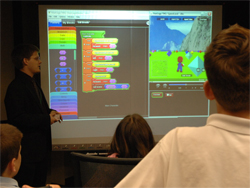 (July 2008) “Kids today!” goes the all-too-common refrain. “How in the world do you teach them about the importance of science and technology? How can you inspire them about science when, it seems, they’re glued all the time to their computers and video games?”
(July 2008) “Kids today!” goes the all-too-common refrain. “How in the world do you teach them about the importance of science and technology? How can you inspire them about science when, it seems, they’re glued all the time to their computers and video games?”
One way could be to harness the technologies and learning approaches used by—what else?—computers and video games. Many educators say that innovative computer programs can teach students, and their teachers, how to think creatively and solve problems just like scientists do.
This, precisely, is the goal of The Imagination Toolbox, a middle and high school teaching initiative created by the Massachusetts Institute of Technology (MIT). The initiative is sponsored by the DHS S&T Directorate’s Office of University Programs, which, among other things, supports education to prepare future scientists and leaders in homeland security fields.
Composed of a series of classroom lesson plans, the Toolbox teaches students how to use specialized educational software called StarLogo TNG (for The Next Generation). Developed by MIT’s Scheller Teacher Education Program, StarLogo TNG is a free computer programming tool that teaches kids to build computer games, models, and simulations using graphics and 3-D images. Basically, the students connect differently shaped graphical blocks, and thereby control the behaviors and actions of characters and things in a 3-D world. They dictate the outcome from start to finish.
The Toolbox looks at real-world problems to teach students how to apply math and science concepts using StarLogo TNG to examine these problems. Students learn that even though a certain situation may not have any apparent or centralized cause, there can still be a systematic reason for it, as well as a systematic way (or ways) to address it. They also learn about how to use computer science to study complex problems.
One lesson plan, for example, challenges students to use StarLogo TNG to simulate the start of a forest fire, as well as coordinate efforts to fight the fire. The kids control various parameters, from the speed of the wind to the speed of the first responders at the scene. They can design areas around houses to reduce wildfire damages, and then test their designs when the fire is lit and the firefighters arrive.
“We want to enable and empower students to think scientifically and become more informed citizens,” said MIT’s Ricarose Roque, who heads up the testing and development of the Toolbox. “We don’t want them to think just in terms of cause and effect; we want them to become more familiar with a systems-thinking approach to understanding pressing and complex problems we have today.”
Roque, along with the rest of the Imagination Toolbox team, is currently piloting curriculum units at a middle school in Lawrence, Mass., north of Boston. The curriculum units investigate real homeland security issues that are the focus of the DHS Centers of Excellence (COEs). Based at leading universities around the country, the COEs are sponsored by University Programs to conduct research in areas of critical importance to DHS, such as how to protect the food supply and prevent epidemics or how to prepare for and respond to natural disasters. The team is designing the lessons by incorporating the basic principles of the COE research.
Based on the feedback from Lawrence, the team is now planning to host a Toolbox workshop at MIT in August. It will be geared toward middle and high school math, science, and technology teachers in the Boston area. There will also be online teacher workshops in the fall, plus new online tools where teachers, students, and other StarLogo TNG users can share their work and explore the work of others.
To request more information about this story, please e-mail st.snapshots@hq.dhs.gov.
